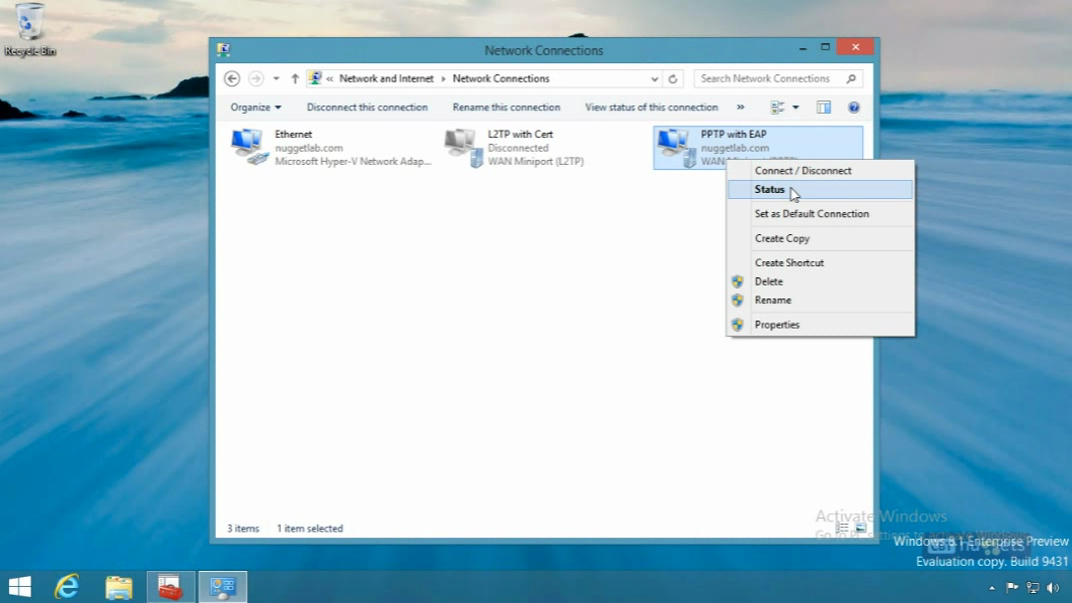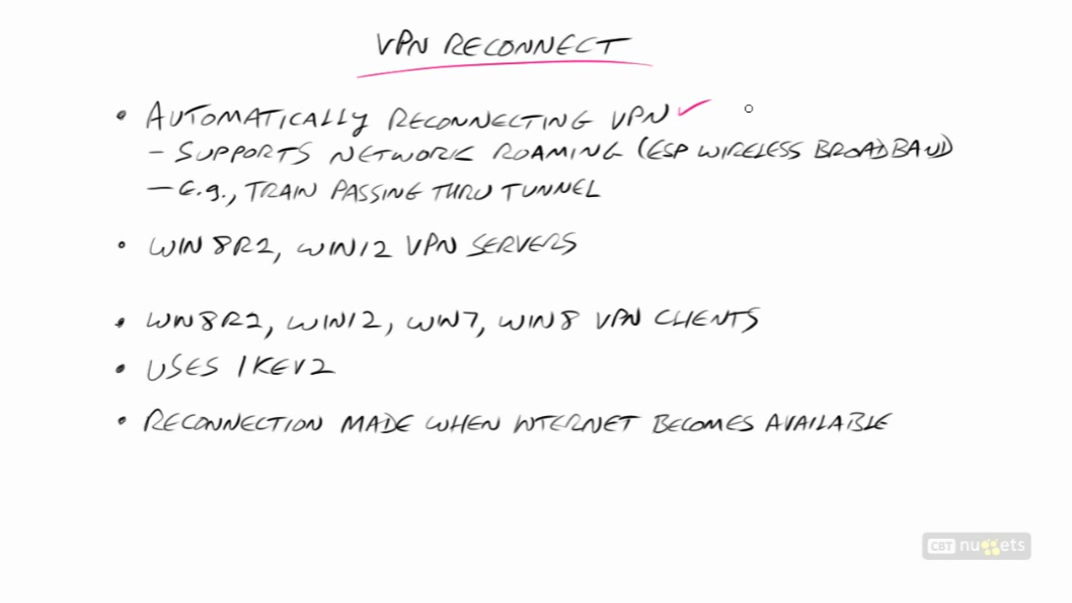
CBT Nuggets 70-688 Managing and Maintaining Windows 8
AAC | 125 Kbps | 44.1 KHz | 2 channels | 12:51:55 | 2.68 GB
This Microsoft Windows 8 training course with James Conrad covers how to manage and maintain Windows 8.
Related area of expertise:
•Desktop Support
Recommended skills:
•Basic PC hardware skills
•Basic Windows knowledge
•If necessary, consider all or parts of the A+ 2012 course and the 70-687 course as a foundation
•Windows Server 2012 knowledge would also be helpful. Consider the 70-410 course to learn a server foundation.
Recommended equipment:
•Viewers who also want to practice Windows 8 administration on their own can do follow most of the demos on a single Windows 8 computer. However, it is strongly recommended that you use virtualization software such as virtual box, VMware, or Hyper-V to install and test multiple other machines. In particular, much of this course uses multiple machines at once and you will need at least a domain controller and one other server besides Windows 8.
Related certification:
•MCSA: Windows 8
Related job functions:
•High-level help desk professionals
•Desktop planners
•Server admins
Get ready to learn Windows 8 with James Conrad. From Windows to Go to managing mobile devices, this course covers all objectives of the Microsoft 70-688 exam. Whether you’re looking to obtain MCSA: Windows 8 certification, or need to learn Windows 8 skills for your job, James has you covered.
This course is geared more toward desktop planners and implementers. Many viewers are likely to also be responsible for at least some server and Active Directory management.
1. Series Introduction (4 min)
In this Nugget, trainer James Conrad walks you through a general outline of the topics/material you will learn in this series.
2. Windows to Go (15 min)
The Windows to Go workspace provides a great way to take a portable copy of Windows to any job site and use your custom settings and applications. In this Nugget, you learn how to design an installation and application strategy, design an operating system installation strategy, understand the requirements of Windows to Go, and see a full demonstration of how to use the technology.
3. Virtual Desktop Infrastructure (24 min)
Virtual Desktop Infrastructure (VDI) is one of the fastest growing and most significant technologies for desktop delivery in the IT world today. In this Nugget, you will learn the differences between Virtual Personal Desktop (PVD) and a Virtual Desktop Pool (VDP). Even though VDI is largely a Windows Server 2012 topic, it’s important to understand the moving parts behind a VDI configuration.
4. Session Virtualization, Multiboot, Native VHD Boot (47 min)
In this Nugget, you will learn how to design an operating system installation strategy with operating system virtualization using session virtualization; implement multi boot; and perform native VHD boot.
5. Alternative Installation Methods (32 min)
In this Nugget, you will learn about some additional installation methods including Windows Deployment Services (WDS), Preboot Execution Environment (PXE), install.wim, boot.wim, creating a capture image, creating a boot image, adding drivers to WinPE, WinRE, and boot images, and retaining Sysprep /generalize hardware configuration with the PersistAllDeviceInstalls option from the Windows System Image Manager.
6. User Profiles (38 min)
In this Nugget, you will learn how to design an operating system installation strategy; compare an upgrade vs. migration; design a solution for user settings; understand user profiles; implement Windows Live integration; and implement roaming user profiles, mandatory profiles, and super mandatory user profiles.
7. Migration and Folder Redirection (38 min)
In this Nugget, you will learn how to design an operating system installation strategy; design a solution for user settings; work with user profiles, User State Migration tool, Windows Easy Transfer, USMT 5.0/WET; folder redirection; and user experience virtualization (UE-V)
8. Desktop Applications (27 min)
In this Nugget, you will learn how to design an application strategy for desktop applications, implement application compatibility using Client Hyper-V; implement the Application Compatibility Toolkit (ACT) to inventory system software applications and hardware, provide shims (fixes) for incompatible apps.
9. App-V (20 min)
In this Nugget, you will learn how to design an application strategy for desktop applications; implement App-V and understand its advantages; and use it to provide application co-existence.
10. Internet Explorer (22 min)
In this Nugget, you will learn how to design an application strategy for desktop applications; implement SmartScreen to manage application reputation; and use the Internet Explorer Administration Kit (IEAK) for Internet Explorer 10 management
11. Office 365 (21 min)
In this Nugget, you will learn how to design an application strategy for cloud applications with Microsoft Office 365 and Skydrive.
12. Windows Store and Applocker (27 min)
In this Nugget, you will learn how to design an application strategy for cloud applications; implement Windows Store applications; restricting Windows Store content; make internal content available through Windows Store or provisioned applications; and implement AppLocker.
13. Name Resolution and IPv4 (32 min)
In this Nugget, you will learn how to design for network connectivity, configure IPv4 and understand decimal and binary addressing, and understand DNS name resolution.
14. IPv6 and Wireless (35 min)
In this Nugget, you will learn how to design for network connectivity; learn IPv6; hex numbering; common types of IPv6 addresses; and wireless networking including: Network Security, Service Set Identifier (SSID) Wired Equivalency Protocol (WEP), Wi-fi Protected Access (WPA) and WPA2, Advanced Encryption Standard (AES), Temporal Key Integrity (TKIP), and MAC filtering.
15. Windows Firewall (17 min)
In this Nugget, you will learn how to design for network connectivity; learn network security using Windows Firewall and Windows Firewall with Advanced Security, how to block specific programs or ports, and how to authenticate specific connections.
16. VPN Connections (18 min)
In this Nugget, you will learn how to design for network connectivity; configure VPN connections including Direct Access, Internet Key Exchange v2 (IKEv2), Point to Point Tunneling Protocol (PPTP), Layer 2 Tunneling Protocol (L2TP), Secure Sockets Tunneling Protocol (SSTP); and Extensible Authentication Protocol (EAP), MS-CHAP v2.
17. Remote Administration: WinRM and RDP (23 min)
In this Nugget, you will learn how to implement off-network use and management; design for remote access; configure and use Remote Desktop Protocol (RDP); implement remote administration using Remote Desktop Connection and Remote Desktop Management; perform Remote Assistance; and connect remotely using WinRM and PowerShell.
18. Remote Administration: PowerShell, RSAT, and MMC (18 min)
In this Nugget, you will learn how to design for Remote Access including using PowerShell, the Remote Server Administration Tools (RSAT), and MMC consoles to remotely connect and administer destination computers; and implement off-network use and management.
19. Remote Administration: Local vs Microsoft Accounts, Workgroup vs Domain (19 min)
In this Nugget, you will learn about design for authentication and authorization, workgroup vs. domain; trust relationships; and local account vs. Microsoft account.
20. Authentication: Logon Alternatives and Smartcards (14 min)
In this Nugget, you will learn about design for authentication and authorization; picture password logon; PIN logon; and two-factor authentication including certificates, smart cards, and biometrics
21. Manage Data Storage (30 min)
In this Nugget, you will learn to manage data storage; resolve data storage issues; implement storage quotas; manage pools; and manage data availability using BranchCache.
22. Manage Data Security (37 min)
In this Nugget, you will learn to manage data security; manage share/NTFS permissions for storage spaces; determine how to calculate effective permissions; configure EFS; configure security for removable media; and manage BitLocker and BitLocker To Go.
23. Manage Hardware and Printers (32 min)
In this Nugget, you will learn how to manage hardware and printers; resolve hardware and device issues; sync devices and resolve sync issues; monitor and manage print servers, use PowerShell cmdlets to identify specific printers, and stop print jobs; and configure separator pages.
24. Manage Mobile Devices (24 min)
In this Nugget, you will learn to: manage mobile devices, resolve mobility issues; manage mobile device policies including security policies, NFC, secure SIM, and remote access; manage mobile access; manage Microsoft Exchange ActiveSync in mobile devices and configure native email Outlook Web Access client for Exchange connectivity.
25. Design a Recovery Solution (30 min)
In this Nugget, you will learn to design a recovery solution; implement PC refresh/reset; Windows 7 file recovery; recovery drive; system restore; user files including local files, file history; application settings; and implement advanced startup options.
26. Manage Endpoint Security (40 min)
In this Nugget, you will learn to manage endpoint security; resolve endpoint security issues; implement Action Center; manage updates using Windows Update; manage client security using Windows Defender; manage client security using the Microsoft System Center 2012 Endpoint Protection client; and learn an overview of how Windows Server Update Services (WSUS) works.
27. Manage Clients by Using Windows Intune (33 min)
In this Nugget, you will learn to manage clients by using Windows Intune; manage updates and update groups; configure the company portal; monitor on-network and off-network machines; manage asset inventory; and distribute software.
28. Monitor and Maintain Clients by Using MDOP (41 min)
In this Nugget, you will learn to: Monitor and maintain clients by using MDOP, Remediate startup issues using the Diagnostics and Recovery Toolkit (DaRT); monitor clients using System Center Desktop Error Monitoring; manage BitLocker and BitLocker To Go using Microsoft BitLocker Administration and Monitoring (MBAM).


Download uploaded
http://uploaded.net/file/gdplcu2z/70-688.Managing.and.Maintaining.Windows.8.part1.rar
http://uploaded.net/file/6t8dedea/70-688.Managing.and.Maintaining.Windows.8.part2.rar
http://uploaded.net/file/d8v4ulid/70-688.Managing.and.Maintaining.Windows.8.part3.rar
http://uploaded.net/file/3egbkvea/70-688.Managing.and.Maintaining.Windows.8.part4.rar
http://uploaded.net/file/65vm3b4w/70-688.Managing.and.Maintaining.Windows.8.part5.rar
http://uploaded.net/file/e5c15uly/70-688.Managing.and.Maintaining.Windows.8.part6.rar
Download nitroflare
http://nitroflare.com/view/0501DFFCEFFB384/70-688.Managing.and.Maintaining.Windows.8.part1.rar
http://nitroflare.com/view/0746AA76FABD0B0/70-688.Managing.and.Maintaining.Windows.8.part2.rar
http://nitroflare.com/view/23E89DFC57E689F/70-688.Managing.and.Maintaining.Windows.8.part3.rar
http://nitroflare.com/view/36C7A8D098A1C92/70-688.Managing.and.Maintaining.Windows.8.part4.rar
http://nitroflare.com/view/6830770EDC5BBE1/70-688.Managing.and.Maintaining.Windows.8.part5.rar
http://nitroflare.com/view/BF016FEA6329EA9/70-688.Managing.and.Maintaining.Windows.8.part6.rar
Download 百度云
你是VIP 1个月(1 month)赞助会员,
转载请注明:0daytown » CBT Nuggets 70-688 Managing and Maintaining Windows 8